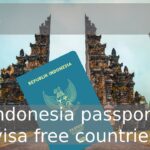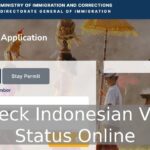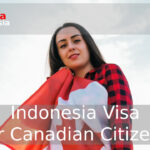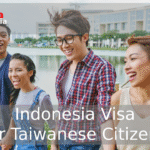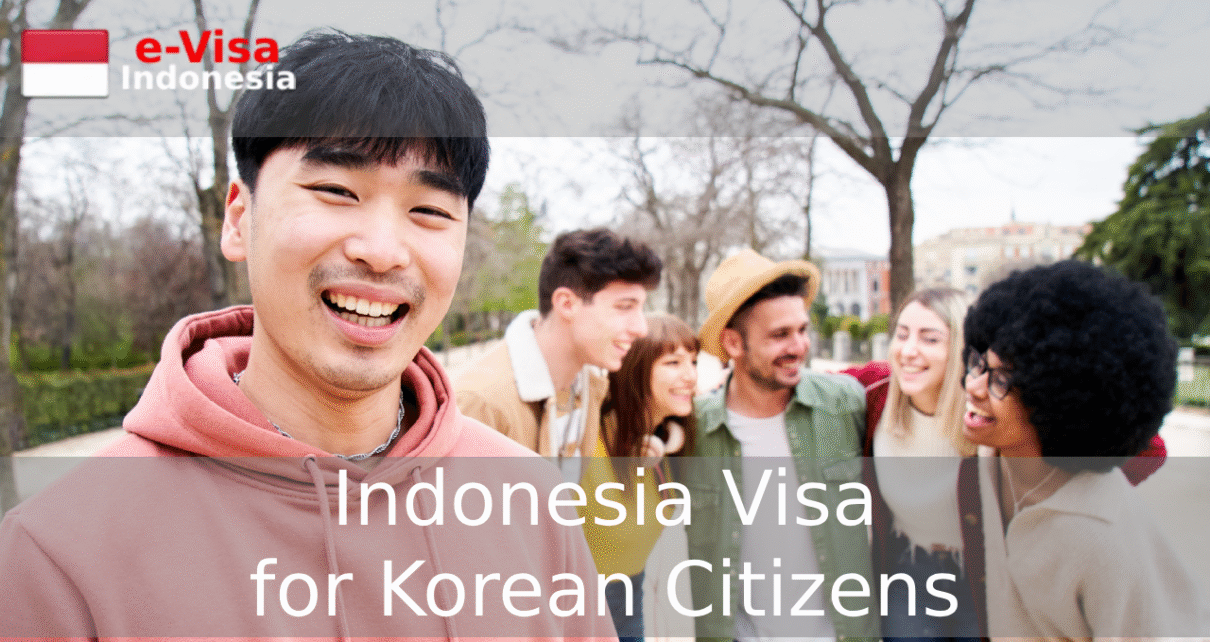
South Korean citizens need a visa to visit Indonesia for any purpose and for any duration.
Indonesia offers a variety of visas to meet the needs of different travelers, with the most common options for short-term leisure and business being a Visa on Arrival (B1) for 30 days of stay and a Single-Entry Visit eVisa (C1) for a 60-day trip.
When applying for the VOA, South Korean nationals can obtain it upon arrival at designated ports in Indonesia or online.
For those choosing any type of eVisa, the process should be completed electronically before the visit.
Travelers from South Korea must make sure they have a passport with at least 6 months of validity remaining from the date of entry, and may be required to present other documentation.
IMPORTANT: South Korean visitors should check the latest Indonesia visaregulations, as policies may change over time.
Types of Indonesian Visas for Korean Nationals
There is a wide range of Indonesian visas to accommodate the diverse purposes of travel, from short-term tourism to long-term stays for work, study, or investment.
Understanding these visa categories helps travelers from South Korea choose the appropriate permit based on their individual needs and guarantees compliance with immigration regulations.
Tourism
These visas are for leisure activities such as vacations, sightseeing, and visiting family or friends. They generally allow stays of 30–60 days.
- B1 Visa on Arrival (Tourism)
- C1 Tourism Visa
- D1 Tourism Visa
- F1 Visa on Arrival (Tourism)
Government & Business
Designed for official delegations, business meetings, investment preparation, and corporate functions, this category does not permit permanent work.
- A4 Visa Exemption (Government Business)
- C2 Business Visa
- C10 Business Event Visa
- D12 Pre-Investment Visa
Crew
Issued to crew members working aboard international ships, flights, or other modes of transportation entering Indonesia.
- A36 Visa Exemption (Foreign Crew)
- A37 Visa Exemption (Foreign Crew)
- C13 Foreign Crew Visa
Work & Training
These permits support temporary work, internships, training programs, and special assignments like filmmaking or emergency technical support.
- C14 Entertainment Activities Visa (Filmmaking & Production)
- C15 Emergency Work Visa
- C22 Internship Visa
- E35 Work and Tour Visa
Study & Education
Available to students, scholars, and participants in formal education or research. The category includes academic programs, language study, and research projects.
- E29 Scientific Research Visa
- E30A Student Visa
- E30B Education Visa
- C9B Indonesian Language Course & Training Visa
Family
The permits are issued for reunification with Indonesian family members or legal residents, including spouses, children, and parents.
- E31A Family Visa
- E31B Spouse Visa (for ITAS/ITAP holders)
- E31C Child Visa (of Indonesian parent)
- E31G Parent Visa
Former Indonesian Citizens
For former Indonesian nationals and their first- or second-degree family members, these visas allow extended or long-term visits.
- E32A Former Indonesian Citizen Visa
- E32B Family of Former Citizens Visa
- E32C Former Citizens Visa (Stay up to 2 Years)
- E32D Former Citizens Visa (Stay up to 1 Year)
Investment
Suitable for South Korean citizens establishing or investing in companies, startups, or branch offices in Indonesia.
- E28A Investor Visa
- E28B Company Establishment Visa
- E28C Non-Company Establishment Visa
- E28D Branch Office Visa
Long-Term & Special Stay
The category covers non-working long-term stays such as for retirement, remote work, or special talents.
- E33 Second Home Visa
- E33A Special Skills Visa
- E33C World Figure Visa
- E33E Elderly Visa
Medical
Medical Visas allow South Koreans to receive medical treatment, consultation, or health procedures in Indonesia.
- C3 Medical Treatment Visa
- D3 Medical Treatment Visa
Culture, Arts & Media
These visas are for participation in cultural events, performances, media coverage, or filmmaking activities.
- C5 Media & Press Visa
- C7 Art & Cultural Activity Visa
- C7A Music Performance Visa
- D14 Filmmaking & Production Visa
Sports
Issued to athletes, team officials, and coaches taking part in competitions, training, or sports programs.
- C8A Athlete Visa
- C8B Sports Official Visa
- D8A Athlete Visa
- D8B Sports Official Visa
Other Special Visas
This category applies to unique cases like judicial matters, religious missions, technical audits, and post-sales business services.
- C21 Judicial Proceeding Visa
- C10A Preacher Visa
- C17 Business Inspection & Audit Visa
- C19 Business Visa (After-Sales Services)
Securing the correct visa type is essential for a smooth entry into Indonesia and to avoid potential issues during stay.
Necessary Documents for an Indonesian Visa
Each Indonesian visa type requires specific documentation. However, some of the files are necessary in most applications, such as:
- A passport with at least 6 months’ validity from the date of entry into Indonesia.
- A recent face photograph meeting visa specifications.
- Proof of a return or onward ticket to demonstrate the intention to leave the country.
- Supporting documents relevant to the visa type, such as invitation letters, evidence of enrollment, or employment verification.
South Korean nationals should make sure all files comply with the Indonesian visa authority’s requirements to avoid delays.
Application Process for an Indonesian Visa
The Indonesian visa application process varies depending on the chosen permit type. When it comes to the Electronic Visa on Arrival (B1), South Koreans need to:
1. Go to https://evisa.imigrasi.go.id/ and hit the “Apply” button.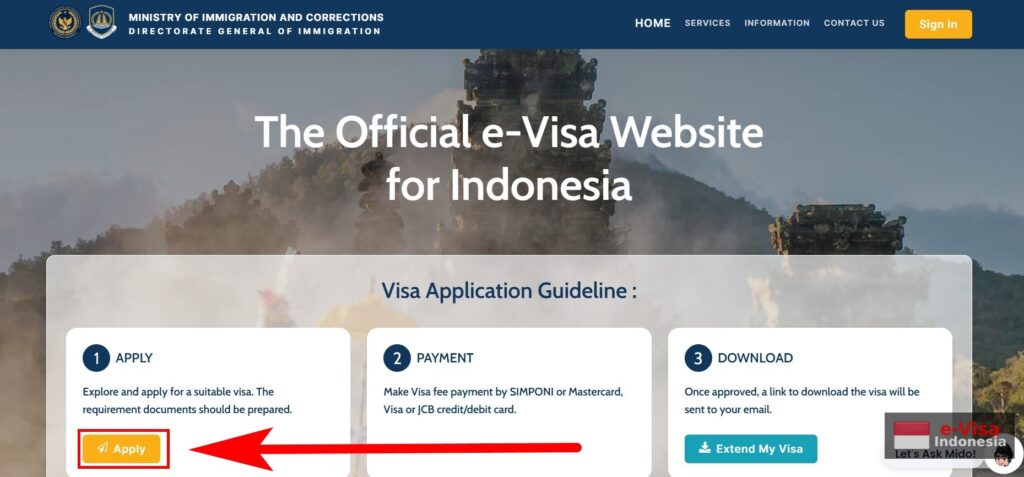 2. Pick South Korea from the dropdown menu.
2. Pick South Korea from the dropdown menu.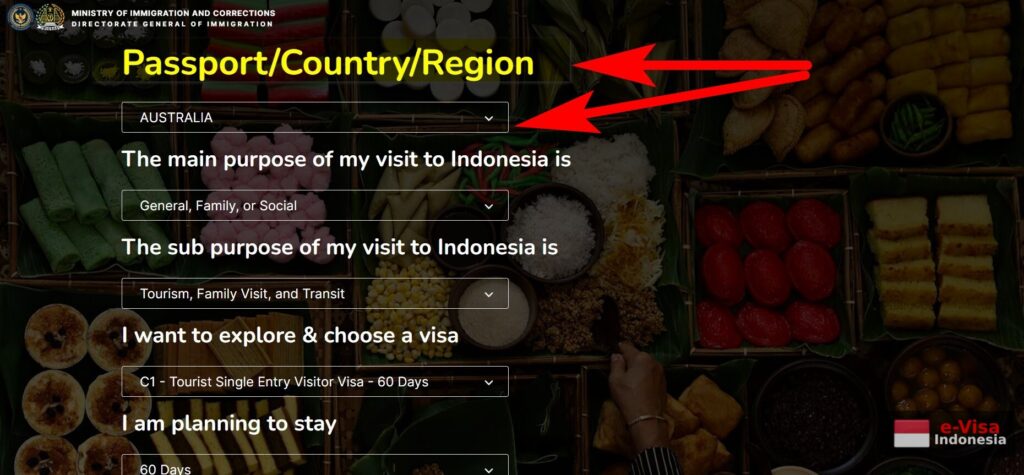 3. Select the main and sub purposes of the visit from the categories.
3. Select the main and sub purposes of the visit from the categories.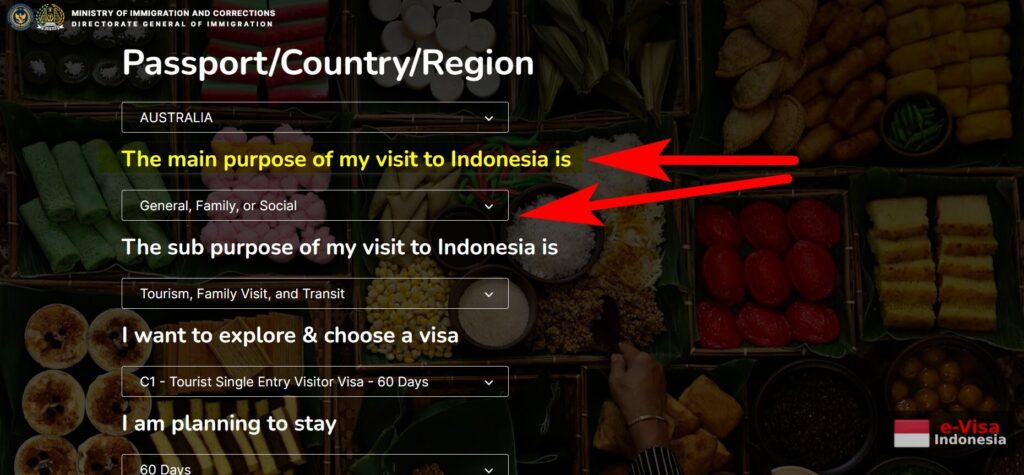 4. Choose the visa type based on the options provided for the selected purposes.
4. Choose the visa type based on the options provided for the selected purposes.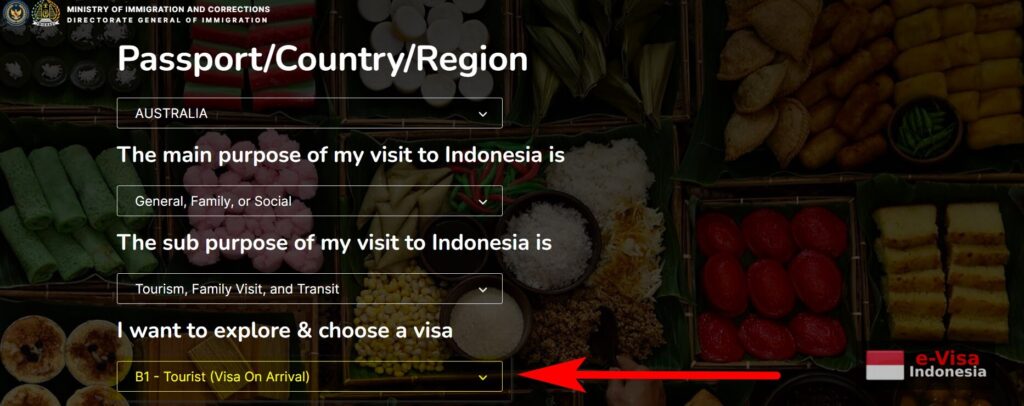 5. Click “Detail & Apply” to proceed to the next section.
5. Click “Detail & Apply” to proceed to the next section.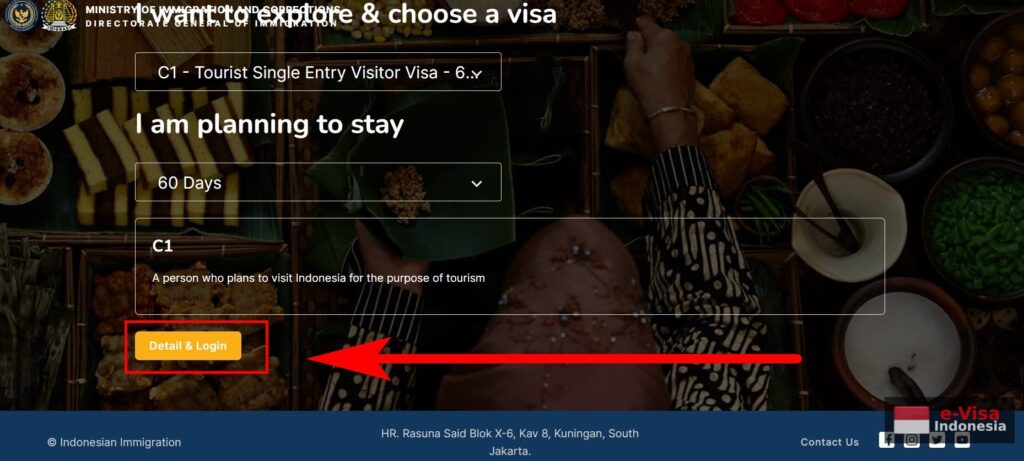 6. Read all the information about the chosen type of visa, and then click “Apply” to continue.
6. Read all the information about the chosen type of visa, and then click “Apply” to continue.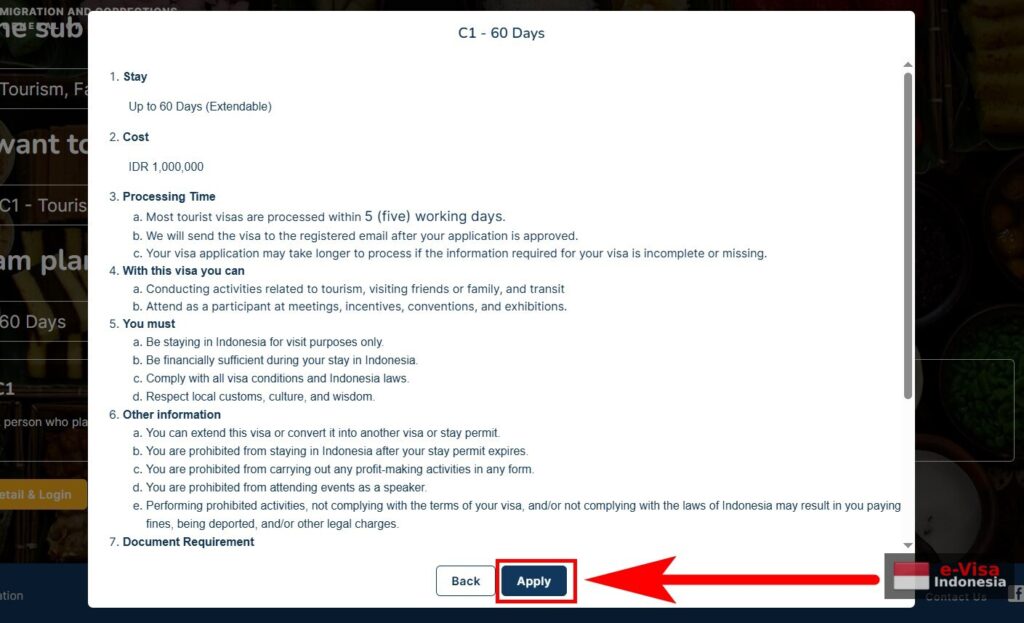 7. Upload the passport and formal photo that meet the quality requirements.
7. Upload the passport and formal photo that meet the quality requirements.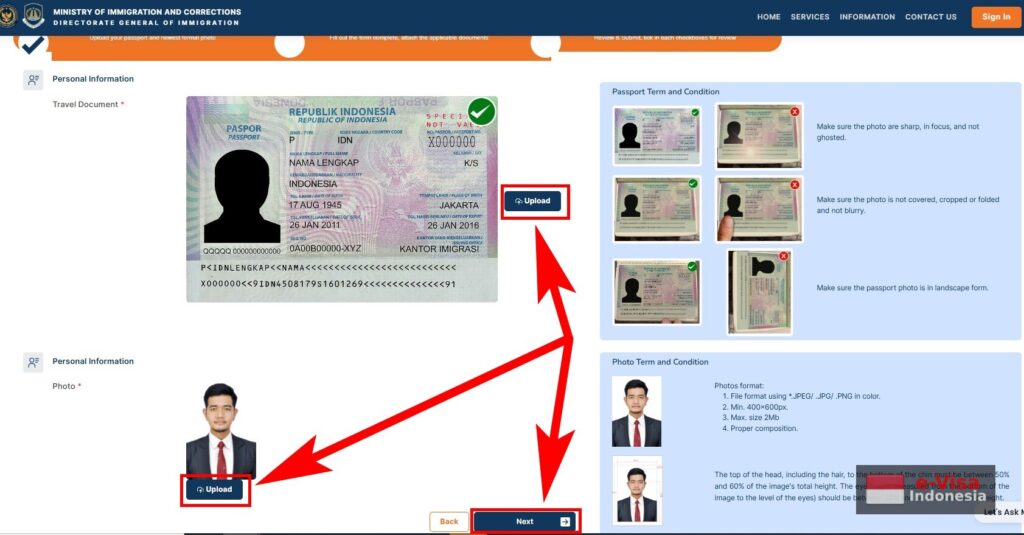 8. Complete the form (provide name, date of birth, phone number, and more).
8. Complete the form (provide name, date of birth, phone number, and more).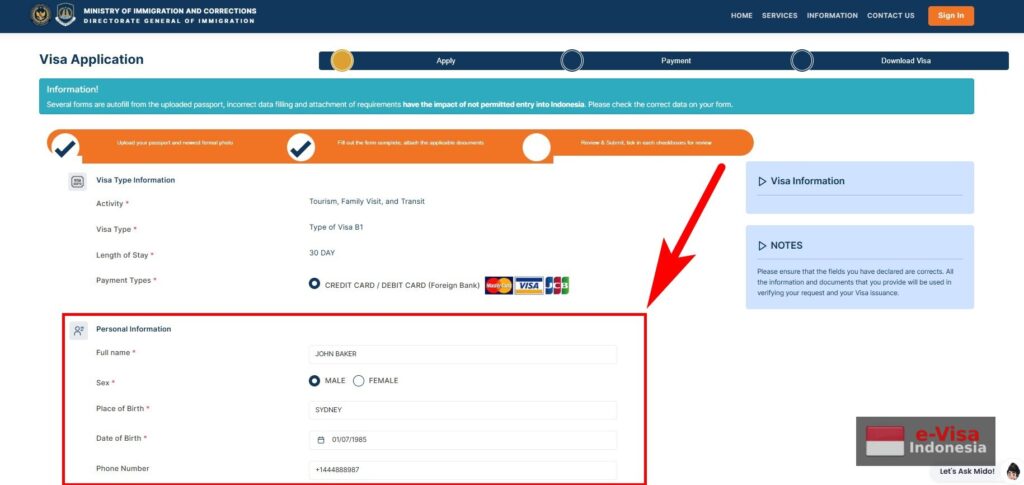 9. Share the passport details, such as number, nationality, issuing place, etc.
9. Share the passport details, such as number, nationality, issuing place, etc. 10. Enter the type and address in Indonesia.
10. Enter the type and address in Indonesia. 11. Send the required documents in PDF format:
11. Send the required documents in PDF format:
- Passport valid for at least 6 months.
Return ticket or onward ticket. 12. Fill in and confirm the email address, then click “Next”.
12. Fill in and confirm the email address, then click “Next”. 13. Review the application – tick each checkbox to confirm the data, then hit “Save”.
13. Review the application – tick each checkbox to confirm the data, then hit “Save”.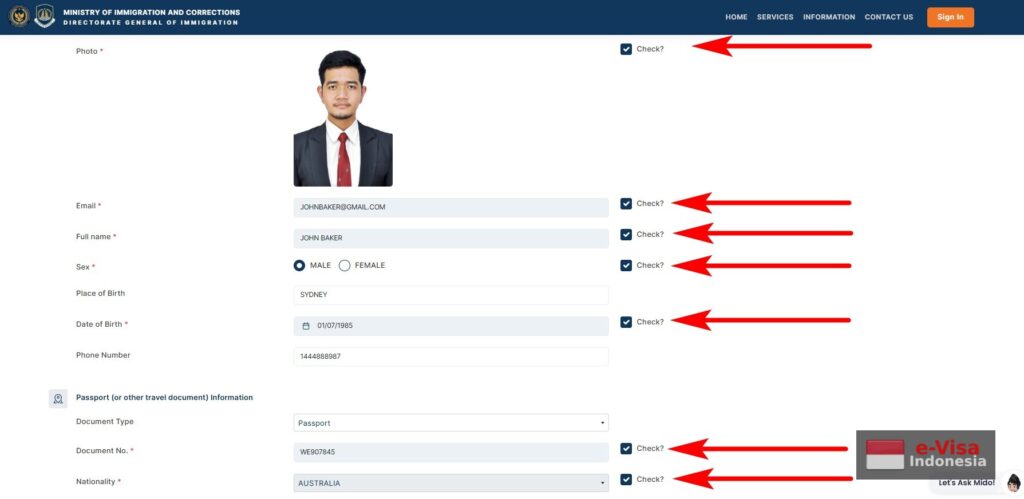
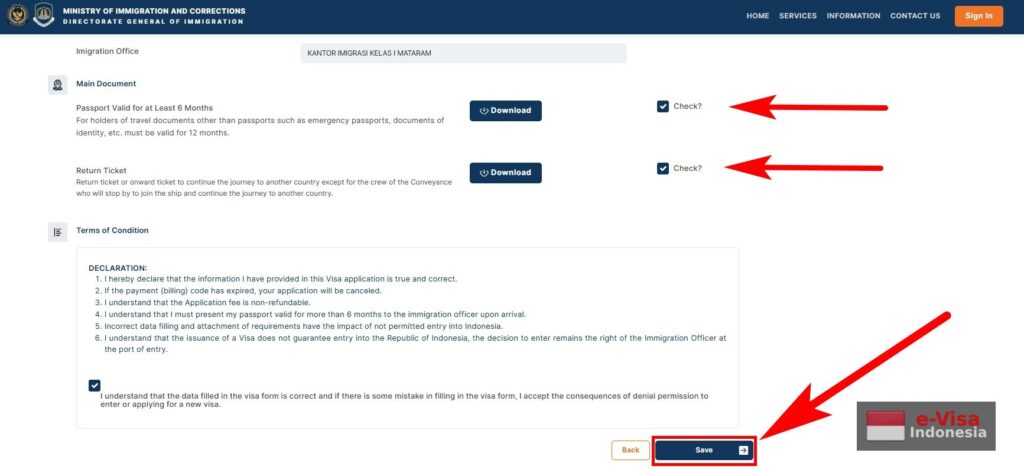 14. Click “Submit” to send the application.
14. Click “Submit” to send the application.
15. Carefully check the data and click the “Payment” button.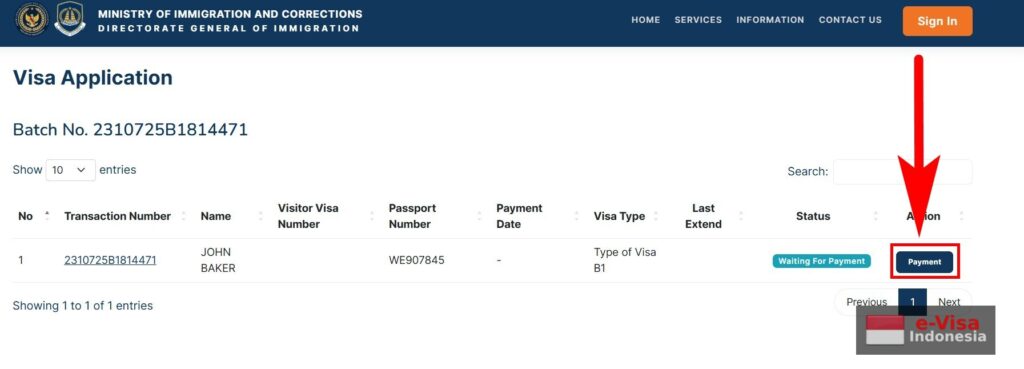
16. Enter the card details and click “Pay Now”. It’s important to complete the payment within 120 minutes – otherwise, the application will automatically expire.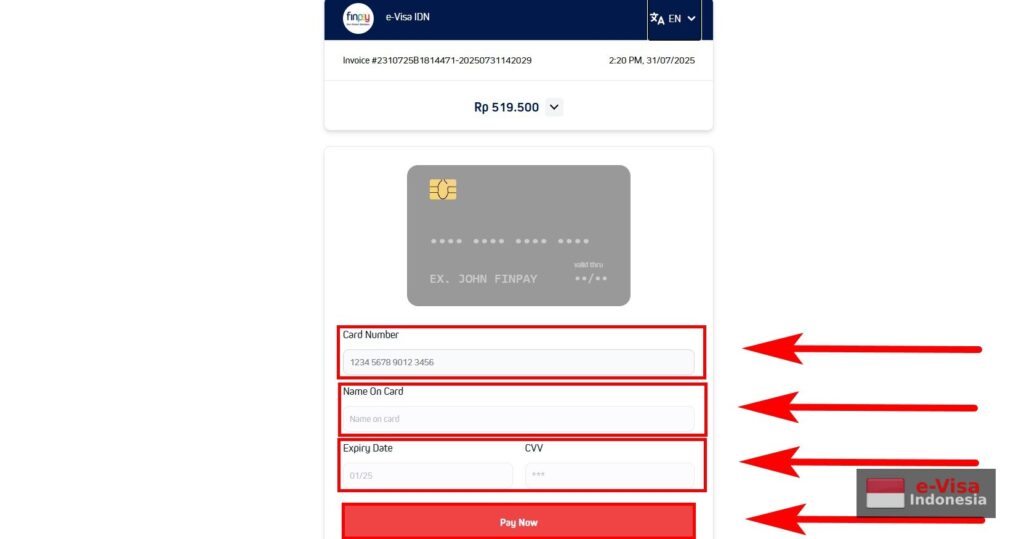
17. Wait for processing (the time is usually up to 24 working hours).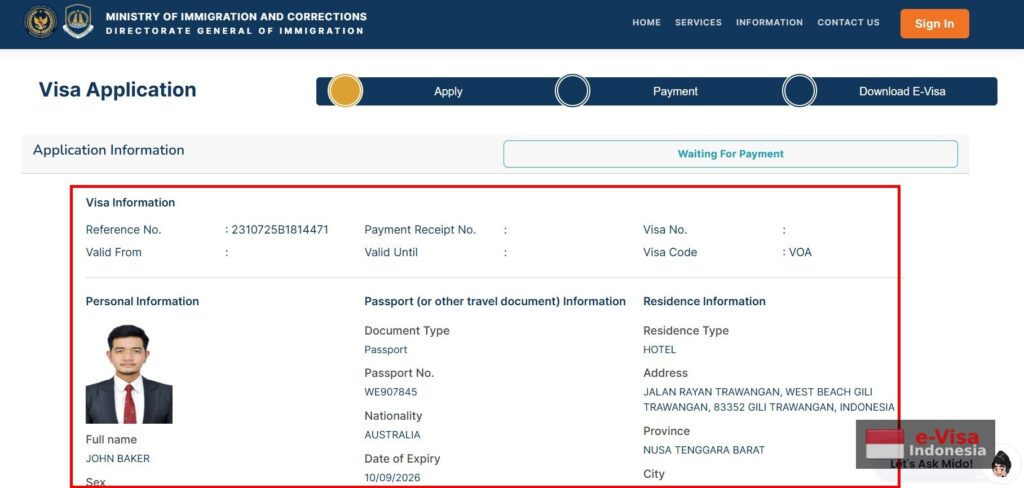
18. Click “Download Visa” after approval and print it out. Make sure you carry the printed visa during travel, as it will be needed for immigration checks.
The application is essential for obtaining the Indonesian visa and ensuring smooth entry into Indonesia.
Processing Time of the Indonesian Visas
The processing time for Indonesian visas depends on the specific type Koreans are getting.
For instance, a B1 visa, which is typically issued for tourism or business purposes, may take up to 24 working hours to review.
On the other hand, a C1 visa, commonly granted for short visits of up to 60 days, often has a processing period of around 5 working days.
It is crucial to factor in these differences when planning travel to enable time for approval.
Additionally, unforeseen delays due to incomplete documentation or high volumes of applications should also be taken into consideration.
Stay, Validity, and Extensions of the Indonesian Visas
The validity, stay, and extension of an Indonesian visa are strictly connected to the specific type of permit issued.
For example, a B1 visa, typically granted for tourism visits, allows a maximum stay that cannot exceed the period specified in the visa, usually 30 days within a 90-day validity period, depending on the purpose.
Extensions for such visas require proper documentation and approval from Indonesian immigration authorities.
Travelers from South Korea must be compliant with the regulations to avoid penalties or complications during their stay.
Entry Requirements
The conditions for entry must be fulfilled in order to have a smooth experience in Indonesia.
Thus, South Korean citizens visiting Indonesia must follow several entry conditions for a smooth trip:
- Hold a passport with at least 6 months’ validity and two blank pages
- Obtain an Indonesian visa, such as a B1 or C1 permit
- Present a return or onward ticket
- Complete the SATUSEHAT health pass form before arrival
- Register with the local police if staying in private accommodation to avoid fines
- Carry a yellow fever vaccination certificate if arriving from a high-risk country
- Pay the IDR 150,000 tourist levy when visiting Bali
Always use official immigration channels and carefully follow all rules to avoid scams or penalties.
Indonesia Embassy for Korean Citizens
Korean citizens can contact the Indonesian Embassy in South Korea for further assistance.
The diplomatic mission provides essential services such as visa applications, passport renewals, legal document authentication, and support during emergencies.
It plays a crucial role in fostering diplomatic relations and ensuring the well-being of Indonesian citizens abroad.
- Address: 380 Yeouidaebang-ro, Yeongdeungpo-gu, Seoul, Republik Korea 07342
- Phone: 02-2224 9000
- Email: seoul.kbri@kemlu.go.id
FAQ about an Indonesian Visa
- Can Korean citizens enter Indonesia without a visa?
Korean citizens are required to obtain an appropriate visa to enter Indonesia. For short-term visits of up to 30 days, a Visa on Arrival or an Electronic Visa can be easily applied for.
- Can I work in Indonesia on a Tourist Visa?
No, working in Indonesia requires a proper visa and permit. Employment is prohibited if you are a holder of a Tourist Visa.
- What is the validity period of a B1 visa for Indonesia?
A B1 visa for Indonesia is typically valid for 90 days and enables a 30-day stay. It can be extended once for an additional month.
- Is there an Embassy of Indonesia in Korea?
Indonesia has an embassy located in Seoul, South Korea. It provides various consular services, including visa applications, passport renewals, and assistance.
- How long should my passport be valid to travel to Indonesia?
The passport must be valid for at least 6 months from the date of your entry into Indonesia.
- Are there any vaccination requirements to enter Indonesia?
While there are no mandatory vaccinations for most travelers, it is recommended to have routine vaccines updated. Also, a yellow fever vaccination may be required if you are coming from countries where the disease is common.
Conclusion
Understanding Indonesia’s visa options is essential for a hassle-free trip, especially for Korean citizens who need a permit to enter the country.
Travelers should double-check that their passport is valid for at least 6 months from the entry date and carry printed or digital copies of necessary documents.
It is also advisable to stay informed about any recent restrictions or requirements before departure for Indonesia.
Sources
Hi, I’m Kartini Sisingamaraja! I’m an Indonesian travel blogger and a migration and visa expert with years of experience, including working for Indonesia’s Ministry of Immigration and Corrections. Traveling is my passion, and I love sharing my adventures, tips, and insights to help others explore the world with ease. Whether you’re looking for hidden gems in Indonesia or need guidance on visas and migration, I’m here to make your journey smoother and more exciting. Let’s explore together!

